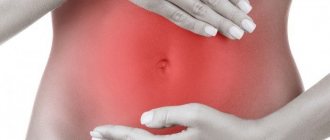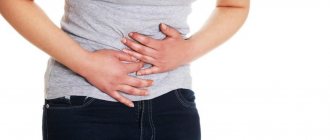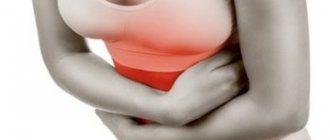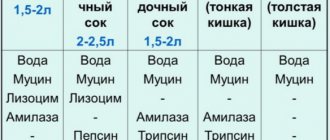If you feel nauseous or have stomach pain at night, you can try taking activated charcoal or another sorbent. Eating low-quality foods can also cause pain. Discomfort in the stomach indicates a disruption in the functioning of internal organs, as well as indigestion. People face the problem of abdominal pain in the evenings. When the pain in the stomach is acute, occurring in the late evening or at night, this is evidence that the body has a malfunction in the gastrointestinal tract or that the flora in the intestines is disturbed.
Causes of nighttime stomach pain
Only a medical specialist can determine the true cause of pain in the epigastric region at night. Painful sensations of varying degrees of intensity can be caused by the following painful conditions of the stomach:
- Functional dyspepsia or functional indigestion. It may manifest itself as a “nervous” or “lazy stomach,” that is, with increased or decreased motor activity. Sometimes spastic pain, more bursting pain, sometimes with nausea, possibly vomiting, but always with early satiety, are localized in the epigastrium. The basis for the development of this condition is not inflammation of the gastric mucosa, but a violation of the sensitivity of the receptors of the stomach lining. This is due to chronic stress. Therefore, pain relief with antispasmodics does not bring noticeable relief;
- Gastritis and gastroduodenitis, the cause of which is inflammation of the mucous membrane of the inner wall of the stomach and duodenum. The pain syndrome in these pathologies is unstable and is associated with errors in diet. The acute form of gastritis is characterized by a sudden onset of the disease and is associated with exposure to external irritating factors. The pain is constant day and night; refusing to eat brings relief. In the chronic form of gastritis, pain is regular;
- Peptic ulcer of the stomach and duodenum. The pain is more intense and sharp, occurring immediately after eating with a stomach ulcer and 1.5 - 2 hours after eating;
- Benign neoplasms (polyps) cause painful sensations that occur periodically, associated with eating even in small quantities;
- Malignant neoplasms in the stomach or in organs located next to it;
- Viral or infectious disease of the stomach.
- Diaphragmatic hernia, when part of the organ enters the chest cavity through the diaphragmatic opening in the esophagus;
- Abdominal migraine occurs more often in childhood and at night. Manifests itself in the form of aching stomach pain.
The causes of pain in the epigastric region at night may not be related to the stomach:
- Inflammatory process in the pancreas. Pain occurs after eating;
- Inflammatory bowel diseases, as well as the development of acute appendicitis;
- Intoxications that develop after poisoning with various chemicals.
Stomach pain can also occur in a completely healthy person after:
- eating fatty foods in large quantities;
- stressful situations, during depression;
- drinking alcohol;
- taking certain medications.
Night stomach pain can be caused by pregnancy, especially in the last stages. This is due to the growth of the uterus, which puts pressure on all surrounding organs, which sometimes leads to pain. In principle, they can be associated with disturbances in the functioning of any internal organ and are of a radiating nature.
Night pain in the stomach can also be associated with increased formation of hydrochloric acid without eating. That's what they call them - hungry. As soon as you eat something, they subside.
Inflammatory and acquired
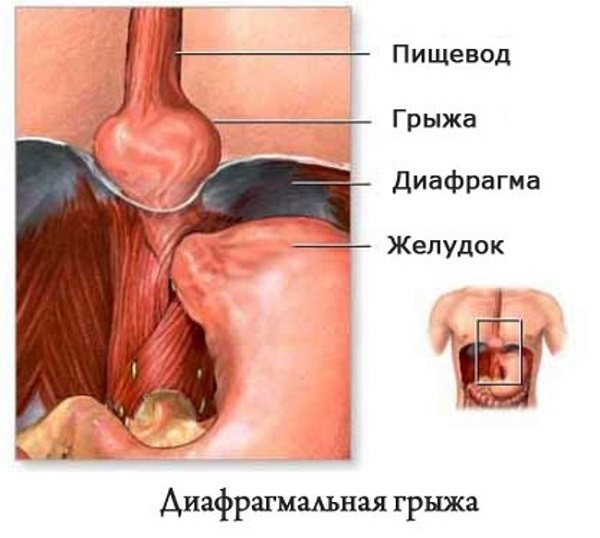
This symptom can be caused by a diaphragmatic hernia.
- Gastritis is an inflammation of the gastric mucosa, which leads to dysfunction of the stomach. It can be chronic and acute. Both adults and children can get this disease. Approximately 80-90% of people have had this disease throughout their lives. Signs of gastritis are nagging pain in the stomach, a feeling of rapid saturation of the stomach while eating, decreased appetite.
- Gallstone disease (GSD) is a disease in which stones form in the gallbladder or bile ducts. The disease usually manifests itself after 5-10 years. The formation of stones occurs mainly due to stagnation of bile and increased salts due to metabolic disorders. The main symptoms are colic in the right hypochondrium, heaviness in the abdomen and yellowing of the skin.
- Diaphragmatic hernia is a deviation accompanied by defects in the form of holes in the diaphragm through which organs penetrate from the abdominal cavity into the chest cavity. Characteristic symptoms of the disease are belching of air and heartburn, which worsens when bending over. Shortness of breath after a heavy meal.
- Acute pancreatitis is a dangerous pathology when aseptic inflammation of the demarcation type of pancreas occurs. The activator of pancreatic enzymes is bile and intestinal juice. Pronounced symptoms are sharp tingling in the upper abdomen, vomiting with bile, and bloating.
- Intestinal infections are diseases caused by viruses, bacteria and toxins that enter the digestive tract. Symptoms depend on the type of pathogen. It happens that in an adult the infection does not make itself felt. Symptoms include loss of appetite, weakness, heaviness in the stomach, nausea and vomiting are also present, the temperature begins to rise and the person feels very chilly.
Symptoms of night stomach pain
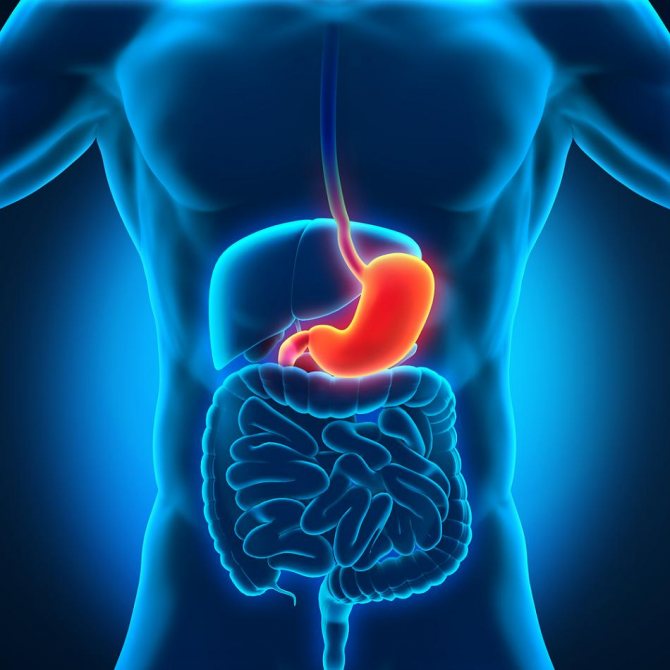
The main symptom is pain, which can have different characteristics: intensity, frequency, localization. It may be accompanied by additional symptoms:
- Heartburn;
- Bitter or sour belching;
- Nausea, vomiting;
- Possible flatulence and bowel dysfunction;
- Insomnia;
- Weakness and sweating;
- Fever, chills;
- Loose stools, mixed with blood or modified (black, or, conversely, light).
Of course, these signs are not observed all at once, but according to the disorder that occurs in the stomach or gastrointestinal tract.
Pain can have different nuances and be expressed in different ways. It can be sharp, sharp, piercing, which is typical for a stomach ulcer. With chronic gastritis, it is quite tolerable, but can be faintly felt, aching in nature, or in the form of spasms. With intestinal inflammation, it is localized in the middle of the abdomen.
Emergency medical attention is needed if severe, stabbing pain occurs in the epigastric region, as this may be a sign of a perforated ulcer.
And you should also seek medical help if, against the background of ongoing pain, the following occur:
- Nausea and vomiting;
- A sharp decrease in blood pressure;
- Heavy sweating;
- Muscle weakness and drowsiness.
These signs can be signals of very serious disorders in the body: incipient myocardial infarction, perforated appendicitis, an attack of cholecystitis or pancreatitis.
Prevention
Basic measures to prevent night pain include:
- compliance with dietary nutrition;
- eliminating bad habits;
- strengthening the body's defenses;
- healthy sleep;
- refusal of a late heavy dinner;
- absence of stressful situations;
- suitable physical activity;
- regular diagnosis of ailments.
Stomach pain at night can be accompanied by various symptoms. Such a negative state indicates the development of pathologies in the gastrointestinal tract. The exact cause of the pain is determined by the doctor after diagnostic measures have been carried out. He chooses an effective treatment regimen, which can be independently supplemented with harmless folk remedies.
Diagnostics
The diagnosis of night pain cannot be based solely on the patient's complaints. It is necessary to conduct a complex of studies to establish the true cause of pain:
- Careful history taking;
- Ultrasound of the stomach and other organs of the gastrointestinal tract helps to identify pathological changes in the structure of the stomach and detect neoplasms;
- Fibrogastroduodenoscopy (FGDS), an effective technique that allows you to examine in detail the mucous membrane of the upper gastrointestinal tract and assess the extent of their damage. Including detecting an ulcerative defect. Along with the study, material is taken from the area affected by the ulcer for a biopsy. The purpose of the study is to identify oncological pathology;
- Magnetic resonance or computed tomography - detects all pathological changes in the organ and differentiates them;
- Tests for bacterial gastric infection Helicobacter pylori (breath test, gastropanel);
- X-ray of the stomach and esophagus if it is impossible for any reason to perform an FGDS
- Blood analysis.
- Fecal occult blood test.
Why does my stomach hurt in the evening: causes, consequences, treatment
Such a pain syndrome as abdominal pain in the evenings is familiar to each of us - lack of adequate nutrition, insignificant snacks “on the go” and large dinners negatively affect our body, as a result of which we may experience discomfort and heaviness in the stomach. As a rule, in order to get rid of such consequences, most of us prefer to resort to the use of various painkillers, which in turn only “masks” the true cause.
And such a course of our actions as a result leads to the fact that the above pain syndrome begins to bother us more and more often, which in turn may indicate the presence of various diseases of the gastrointestinal tract, which occur in a chronic form. So why does your stomach hurt in the evening? And what might this symptom indicate? In this article we will answer these questions for you.

Treatment of night stomach pain

Full treatment is possible only after diagnosing the cause that caused them. Such treatment can be prescribed by a specialist doctor. To relieve spastic pain, you can take an antispasmodic. But this is not a treatment, but only a method of providing first aid.
Effective treatment of night stomach pain is based, first of all, on eliminating the causes that cause it. This is the so-called correct treatment, the principle of which is to prevent pathological mechanisms leading to night pain.
During treatment, antisecretory drugs are prescribed. They reduce the activity of secretory cells and block the increase in acidity levels in the stomach. These drugs include proton pump inhibitors (PPIs):
- Lansoprazole;
- Pantoprazole;
- Rabeprazole;
- Omeprazole and their analogs.
For heartburn, Maalox, Rennie, Gastal tablets are used.
To restore gastric motility, metoclopramide, motilium, itopride or cerucal are prescribed.
If a gastric ulcer and duodenal ulcer is detected, treatment is carried out in a hospital setting or on an outpatient basis. Antibacterial drugs are used to kill Helicobacter pylori, bacteria that cause stomach problems. Additional treatment consists of prescribing enzymes that improve the digestive function of the stomach and gastrointestinal tract as a whole. To activate the immune function of the digestive system, immunomodulators are prescribed.
Treatment and prevention
It is advisable not to eat junk food that affects the functioning of the stomach; if possible, spend more time in the fresh air every day, because walking helps to quickly digest food. You definitely need to stop overeating in the evening. It is regularly recommended to undergo examination and correction of pancreatic enzymes. The doctor will certainly prescribe treatment after a thorough examination, ordering tests and determining the diagnosis. The doctor, based on symptoms and examinations, will prescribe those medications that are characteristic of the disease. Antibiotic medications are more often prescribed if Helicobacter pylori has been identified, and probiotics are prescribed to improve digestion. Sorbents are recommended to be taken if a disorder is present.
Dietary nutrition as a method of treatment
In the complex treatment of epigastric pain, a mandatory component is proper therapeutic nutrition. Dietitians recommend adhering to the following recommendations:
- Consume low-fat dairy products;
- Eliminate fatty meats from the diet - pork, lamb;
- Do not under any circumstances consume canned and pickled foods, spicy, sour and salty foods;
- Don't overeat during the day. Eat food in fractional portions - 6 times a day;
- The last meal should be a light meal and at least 2 hours before bedtime;
- Strictly exclude late-night snacking, alcohol and smoking. All these bad habits contribute to the development of various gastrointestinal pathologies and night pain.
Treatment
Therapy for night pain should be comprehensive.
To relieve the syndrome at home, use the following tips.
Emergency help
A person can help himself the first time he experiences a pain attack. In such cases, you need to act carefully and focus on the intensity and duration of negative manifestations.
To reduce nighttime pain in the stomach, you should give up late dinner, drink a glass of ice water, take a horizontal position and try to sleep.
If the pain does not subside at night and nothing helps, then you can resort to painkillers. The main thing is not to wait until it becomes unbearable, but to call an ambulance.
Traditional medicine
Traditional methods are a complement to the main treatment. Herbal medicine has many positive aspects. It effectively eliminates the symptoms of the disease, has an analgesic effect, enriches the body with valuable substances, removes inflammation of the mucous membrane, and accelerates the healing of erosions.
Painful discomfort at night is effectively relieved by:
- Juice from cucumbers, plantain or St. John's wort. The healing drink should be taken 20 ml three times a day before meals.
- Chamomile decoction. It has analgesic, anti-inflammatory, antibacterial effects.
- Tea made from St. John's wort, dried herb and yarrow. To prepare it you will need 3 tsp. herbal mixture and 0.5 liters of boiled water. The resulting mixture should be left covered for several hours and drunk 200 ml on an empty stomach and at night.
Treatment at home
Drug therapy consists of:
- painkillers (No-Shpa, Spazmalgon, Dexalgin);
- enzyme agents (Mezim, Creon);
- anti-ulcer tablets (Omez, Pantoprazole, Lansoprazole);
- antacid syrups (Almagel, Maalox, Phosphalugel);
- enterosorbents (Smecta, white coal).
To help yourself, you need to give up food for 4-5 hours. When you feel hungry, you can make a cup of weak tea and drink it warm. For severe night pain, you are allowed to drink No-shpa or an antacid. Self-medication is dangerous to your health, so consult a doctor as soon as possible to make a diagnosis and prescribe appropriate drug therapy!
Folk remedies in the treatment of epigastric night pain

You can use folk remedies only if a diagnosis has been established and after consultation with your doctor. They are not the main ones in the treatment of gastrointestinal diseases, but are used as additional treatment.
There are quite a few folk remedies used to relieve stomach pain. A group of vegetable oils stands out against their background. For example, sea buckthorn oil has a good analgesic and wound-healing effect. It contains vitamins B and E, and also creates a protective film on the mucous membrane of the diseased stomach, which is manifested in its analgesic effect.
Directly pressed linseed oil, not subjected to heat treatment, is also useful. It not only relieves pain, but also helps in digestion of food if consumed during lunch or dinner. Infusions of herbs and berries also relieve inflammation and pain at night: blueberries, chamomile, gooseberries, flax seeds. They can be taken in the evening before bed.
Types of pain syndrome
In medicine, this unpleasant symptom in the stomach is called gastralgia. It is described as pain, cramping or acute in nature, resulting from disruption of internal organs, severe stress, and the appearance of malignant neoplasms.
There are several types of nighttime abdominal pain. They differ in reasons of origin, specificity and characteristics.
Psychogenic
The symptom is the result of constant and prolonged stress. Psychogenic night stomach pain is caused by negative emotions, anxiety and behavioral factors.
With this type of pain, there are completely no signs of damage to internal organs. It can be accompanied by various manifestations and have a varied character.
Sometimes psychalgia develops in mentally unhealthy individuals. Most often, suspicious, restless, and hot-tempered people experience this syndrome.
Parietal
The organs of the abdominal cavity are covered with mucous membrane. It consists of a large number of nerve fibers that make it sensitive to pain.
The parietal symptom appears when it is irritated. The pain is sharp and intense, especially when moving and breathing. If you don't take action, they become cutting at night. In this case, you can easily determine their location.
Patients with this type of pain syndrome try to minimize the movement of the abdominal muscles and breathe shallowly in order to relieve pain at night.
Neurogenic
This type is chronic. Pain in the stomach at night periodically appears as “lumbago” and is accompanied by a feeling of numbness and burning.
This unpleasant symptom occurs due to damage to the nerve tissue. As a result of such disturbances, impulses are sent to pain centers.
The causes of neurogenic sensations can be: alcoholism, diabetes mellitus, HIV infection, liver cirrhosis, and multiple sclerosis.
Visceral
The painful syndrome is diffuse in nature, so it is difficult to localize. As a rule, the sensations are blurry, and it is impossible to determine what exactly hurts.
Visceral pain at night occurs as a result of activation of abdominal receptors. Interpreted as hepatic, renal or intestinal colic.
Internal organs are highly susceptible to stretching, inflammation and ischemia. But at the same time they are insensitive to other stimuli, for example, to dissection.
Prevention of nighttime epigastric pain
In addition to mandatory adherence to therapeutic nutrition and giving up bad habits, it is necessary to treat diseases of the stomach and intestines in a timely manner, preventing them from becoming chronic. Regular examination by a gastroenterologist and carrying out appropriate research will help prevent the recurrence of unpleasant symptoms at night.
Self-medication for night stomach pain is strictly prohibited. The true cause of their occurrence can only be identified through a thorough examination using special equipment. Self-medication can blur the clinical picture of the pathological process in a particular organ, which can cause serious complications.
Causes of night pain in children
A child, especially at an early age, often experiences pseudo-abdominal syndrome caused by certain diseases. Such ailments include: otitis media, meningitis, osteomyelitis, tonsillitis, and influenza. Adults, unlike children, do not suffer from abdominal discomfort in these situations.
The main causes of pain in a baby’s stomach at night are:
- cold;
- appendicitis;
- poisoning;
- intestinal infection;
- inflammation of the genitourinary system.
Only a specialist will be able to determine the true cause of a child’s night pain, so at the first symptoms, parents should definitely contact a pediatrician.
Causes of childhood pain
The occurrence of pain at night in infants is a natural process. The digestive system of newborns begins to work in conditions outside the womb, the intestinal microflora is formed, which is why this reaction occurs.
Most often, the appearance of abdominal pain in a baby is caused by the following factors:
- unbalanced maternal diet;
- baby overeating;
- incorrect technique for feeding a baby.
Sources of abdominal discomfort
The list of main factors that can cause pain in the abdominal area includes:
- excessive consumption of salty, smoked, spicy foods that irritate the stomach;
- abuse of fried and fatty foods that provoke colic;
- poor tolerance to dairy products. In this case, the accompanying symptom will also be increased gas formation;
- food allergies to certain foods;
- eating disorder;
- binge eating;
- food poisoning;
- other disorders of the esophagus.
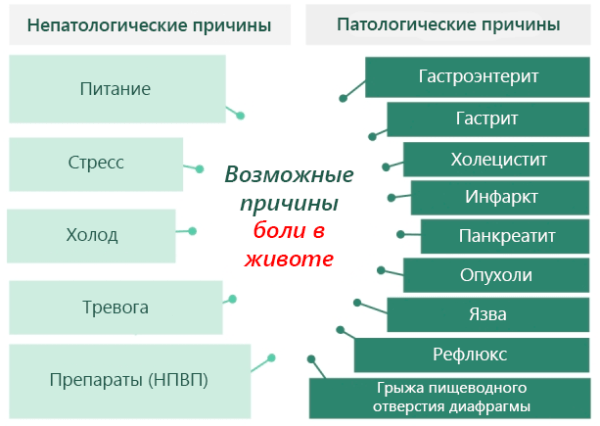
Causes of stomach pain before and after eating
Episodic abdominal pain occurs due to banal overeating or a disordered diet. At work there is not always enough time to have lunch on time, so the interval between the first and second meals is sometimes more than 8-10 hours. After this fast, a person usually overeats, resulting in abdominal pain. Regular non-compliance with the diet can lead to the development of gastritis and other serious disorders of the esophagus. Patients should also pay attention to the quality of food and the method of their preparation, limiting it to boiled and stewed dishes.
Important! Thus, we can conclude that it is necessary to review your own diet if you experience regular pain in the abdominal area. Following a diet is the key to normal functioning of the body during frequent exacerbations of gastrointestinal diseases.
Video - Stomach hurts after eating. What to do?
Why does your stomach hurt at night: reasons, what to do
Medical statistics indicate the frequency of visits with pain syndrome. After a thorough interview, the doctor makes a preliminary diagnosis, prescribes examination and treatment. There are complaints from patients that their stomach begins to hurt in the evening. The mentioned symptom may indicate a problem in the organ and become the first signal about the possible development of a peptic ulcer or gastritis.
Causes of night pain
The stomach begins to hurt with spasms, causing the organ to shrink and stretch. Excessive production of gastric juice occurs and, accordingly, the amount of hydrochloric acid increases. There is irritation of the walls of the organ. Causes of nighttime abdominal pain:
- Inflammatory processes. The source may also be an intestinal infection.
- Excessive gases. Air can accumulate in the stomach during meals, and increased gas formation in other digestive organs, in the intestines, is also possible. If it is impossible to remove them naturally, bloating and discomfort occurs. Pain appears at night due to relaxation of the muscles of the organs.
- Accelerated contraction of the walls of the esophagus.
- Excited state of the patient.
In addition to the reasons, in medicine there is a division of pain itself into a number of types:
- Visceral. Nerve endings located on the walls of the abdominal region are subject to irritation. Characterized by aching and dull pain.
- Parietal. Irritation appears on the peritoneum. The pain syndrome is intense, the source is easily determined. The patient tries to take shallow breaths to minimize the movement of the abdomen and diaphragm, which helps to slightly reduce the pain.
- Psychogenic. The body's negative reaction to stress. The symptoms are very diverse, it all depends on the degree of nervous tension. It usually develops in people who have suffered from mental illness. Manifested by pain in the stomach.
- Neurogenic. Manifests itself as a consequence of diseases associated with human neuralgia. Characterized as chronic pain. Nerve tissue is damaged and pain signals are not sent correctly to the brain. It develops in diseases: alcoholism, diabetes, HIV, multiple sclerosis. The patient feels a burning sensation, numbness, and tingling.
The nature of the pain is used to determine the possible cause. The doctor wants to know what pain syndrome worries the patient: strong, aching, pulsating, shooting, burning. What accompanies the symptom: hunger, nausea, increased gas formation, increased body temperature, sweating. Even a change in the color of urine and feces will help in making a diagnosis.
If the urine darkens and the stool becomes lighter, there is evidence of abnormalities in the gastrointestinal tract. The pancreas, liver and bile ducts should also become the object of close medical attention. The appearance of pain at night and for no apparent reason - the patient is supposed to provide first aid, and be sure to call a doctor in the morning.
Attention! If the color of the stool is dark, closer to black, it means bleeding in the intestines requires urgent hospitalization followed by surgery.
The place where the pain is felt is of no small importance. If the source is located in the upper abdomen, a stomach ulcer, duodenal ulcer, liver or pancreas dysfunction is possible.
If night pain in the stomach is short-lived, this indicates improper and irregular nutrition. It is enough to adjust the menu, give up foods that cause discomfort, and the unpleasant sensation will not bother you.
Major diseases
If the pain does not go away, no matter what position the patient takes, the cause is a disease. There are a number of diseases that cause stomach pain at night.
Gastritis
A disease that affects every third person on the planet. Inflammatory process on the gastric mucosa. This leads to disruption of the organ and leads to disruptions in the functioning of the gastrointestinal tract. The source is considered to be Helicobacter pylori infection.
Uncontrolled use of anti-inflammatory drugs and nervous tension are additional causes of gastritis. The patient complains of aching pain, he is tormented by nausea, vomiting, heartburn, and sour belching.
Symptoms are most pronounced on an empty stomach and at night.
Peptic ulcer
With an ulcer, small wounds form on the walls of the organ, sometimes bleeding. The disease is the result of a prolonged inflammatory process on the mucous membrane. The patient's complaints are similar to those of gastritis. The pain is sharp, acute, worse in the evenings
Gastroesophageal stomach disease
The disease affects the esophagus. Under the influence of acid coming from the stomach, the mucous membrane on the walls of the organ becomes inflamed.
The reason is the inability of the sphincter to completely block the passage for the contents of the stomach into the esophagus. Food and, accordingly, gastric juice are thrown away. The patient experiences heartburn, belching and nausea.
Symptoms intensify at night; in a supine position, the lower part of the esophagus is relaxed and does not block the outflow.
Minor diseases
Rarely occurring diseases, but causing pain in the stomach area. Especially in the evening and before bed.
Diaphragmatic hernia
The position of part of the stomach or intestines relative to the diaphragm changes. More precisely, penetration into the chest of an organ that, under normal conditions, is under a protective sheath. The patient feels heartburn, hiccups, heart rhythm disturbances, and difficulty swallowing. The condition worsens when the body is in a horizontal position.
Abdominal migraine
The main patients with symptoms of the disease are children. Pain syndrome occurs for no apparent reason, and suddenly, at night, the condition worsens. It is believed that this is a hereditary disease.
First aid
For stomach pain, self-medication is dangerous. A consultation with a doctor, examination, and tests are required.
They name the general rules for providing first aid to a patient without taking strong drugs that can relieve pain in order to avoid negative effects on other organs.
The first thing to remember: if you have pain in the stomach, you should not eat. Fasting for several hours will significantly improve the condition. If necessary, it is permissible to drink warm tea. Lie down, calm down, don’t be nervous, raise your legs above your head. Sometimes there is a case when ice water helps, but the patient only needs to take one or two sips and understand whether it will help or not.
Doctors advise drinking mint tea and chicken broth, but in small doses. The intake of any medications and liquids should be accompanied by self-monitoring of the stomach condition on the part of the patient. If tea, water or broth increases pain, it is recommended to immediately stop drinking these liquids.
On the day the pain develops or the next day, you need to contact a gastroenterologist, who will examine, feel, refer you for examination, and make a diagnosis. The main thing is to prescribe treatment that is suitable for a particular patient, taking into account the characteristics of his body.
Today there are thousands of recommendations from people who have been treated and recommend medications. What's good for one may not be good for another. Only a specialist will help the patient choose an individual treatment plan and medications!
Why does my stomach hurt in the evening: reasons
So, as we have already said, most of us periodically encounter such a painful symptom as abdominal pain, which occurs in the evenings. It is also worth noting that most often such painful sensations “overtake” us precisely after eating, which in turn indicates the presence of various diseases of the gastrointestinal tract. So what diseases are we talking about? Next, we will tell you in more detail about the possible causes of abdominal pain in the evenings:
This disease, which in turn is familiar to 80 percent of the entire population, is the most common cause of abdominal pain. The essence of this pathology is the presence of an inflammatory process occurring in the gastric mucosa, which ultimately leads to disruption of various functions of the organ. Despite the fact that gastritis is indeed a “massive” disease, most of those who encounter it pay little attention to the proper treatment of this disease, which in turn can lead to negative consequences, because chronic gastritis can cause the development of such dangerous diseases , like peptic ulcers and stomach cancer.
As for the reasons as a result of which this disease develops, in this situation this is facilitated by a large number of different factors, among which the most common is a violation of the diet and quality of nutrition: fleeting snacks instead of full breakfasts and lunches, consumption of fast foods, as well as fatty, fried and spicy foods negatively affect the gastric mucosa, resulting in the development of gastritis. Abuse of alcoholic beverages and frequent smoking, especially on an empty stomach, also provokes the development of this pathology.
As for the symptoms of the disease, as a rule, the painful sensations can be of a different nature: someone experiences aching and nagging pain, while others experience quite acute pain, which in most cases occurs after eating spicy, fried and fatty foods, and also as a result of prolonged fasting. By the way, if painful sensations arise as a result of a long absence of food intake, then, as a rule, it is enough for the patient to eat a small piece of bread for the pain to subside. In addition to pain directly in the stomach itself, the patient may also be bothered by symptoms such as nausea and vomiting, heartburn after eating, and belching with an acidic taste;
2.Peptic ulcer.
This pathology is a chronic disease, the essence of which is the presence of trophic disorders in the gastric mucosa. According to statistics, gastric ulcers mostly affect men aged 25 to 50 years, however, the recent trend is that women are also quite often found on the list of patients with this disease.
As for the reasons as a result of which this pathology develops, first of all it is worth noting a disease such as gastritis - it is this disease, which occurs in a chronic form, that becomes the main “causative agent” of peptic ulcer disease. However, gastritis is not the only disease as a result of which we may encounter the above diagnosis. For example, various diseases of internal organs can also cause the development of peptic ulcers. And now we are talking about such ailments as pancreatitis, diabetes, tuberculosis, lung cancer, syphilis and so on. Poor nutrition, bad habits, and regular stress also provoke the development of peptic ulcers.




